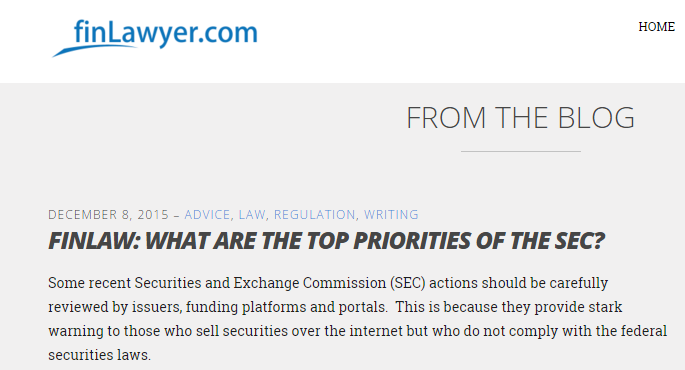
Some recent Securities and Exchange Commission (SEC) actions should be carefully reviewed by issuers, funding platforms and portals. This is because they provide stark warning to those who sell securities over the internet but who do not comply with the federal securities laws.
Unregistered broker-dealer Activity, Yet Another Example
In my last regulatory action update, I discussed SEC Chair Mary Jo White’s keynote address at the 47th Annual Securities Regulation Institute on October 28, 2015. Chair White alerted the industry that unregistered broker-dealer activity is a top priority for the SEC’s Division of Enforcement.
On December 7, 2015, her assertion was verified when the SEC announced that it had charged lawyers and law firms involved in EB-5 transactions with acting as unregistered broker-dealers. (See, Press Release, Lawyers Offered EB-5 Investments as Unregistered Brokers, 2015-274, at http://www.sec.gov/news/pressrelease/2015-274.html ). While not specifically involving the JOBS Act industry, the SEC analysis and the lessons to be drawn from it are instructive. Notably, while one case did involve outright fraud, the bulk of the actions did not, thus highlighting that unregistered broker-dealer activity even without fraud is a priority area for the SEC. Indeed, if individuals like lawyers can be adjudged to be unregistered broker-dealers, it seems relatively easy for the SEC’s analysis to be applied to funding platforms and other internet offerors of securities.
The SEC action was largely based upon the fact that the lawyers, in addition to their legal fees, were receiving remuneration for selling EB-5 securities which constituted transactional based compensation, and was paid only when the attorney successfully sold securities to an investor. Transaction based compensation has always been clear cut unregistered broker-dealer activity. But the SEC found other troubling facts too, including that the attorneys were recommending securities to their clients, acting as liaison between the investment offeror and their client-investors, and facilitating the transfer of investment funds, all without a broker-dealer license.
Section 3(a)(4)(A) of the Exchange Act generally defines a broker broadly as any person engaged in the business of effecting transactions in securities for the account of others. Individuals or entities who participate in important parts of a securities transaction, including solicitation, negotiation, or execution of the transaction, or who are otherwise engaged in the business of effecting or facilitating securities transactions, may be required to register as a broker-dealer. Receiving transaction based compensation, or compensation that is related to the outcome or size of the transaction, is clear cut indicia of broker-dealer activity. As the respondents and practitioners did not comport their activities to the securities law, they were deemed to have acted as unregistered broker-dealers in violation of Section 15(a)(1) of the Exchange Act.
They were ordered, without admitting or denying the SEC’s findings, to cease and desist from acting as unregistered brokers, together with disgorgement of the money they earned (aka “profits” in regulatory-speak), prejudgment interest and a monetary penalty. An Austin, Texas-based attorney and his law firm were jointly and severally ordered to disgorge $30,000, the amount of commissions earned, prejudgment interest of $2,965, and a penalty of $25,000. (See http://www.sec.gov/litigation/admin/2015/34-76568.pdf ) A Florida-based attorney and his law firm, were ordered to pay disgorgement of $228,750, together with prejudgment interest and a monetary penalty. (See http://www.sec.gov/litigation/admin/2015/34-76569.pdf ) Five other lawyers and their law firms were also charged and received similar penalties. The SEC noted these penalties included consideration that each party cooperated and agreed to enter into early discussions with staff to resolve the SEC investigations, thus suggesting perhaps much higher penalties were in store for those who choose not to cooperate and are found to have violated Section 15 of the Exchange Act.
Conculsion: As internet platforms and other offerors of securities can be construed to be functioning as unregistered broker-dealers, take appropriate steps to protect yourself, including using a registered broker-dealer such as FundAmerica Securities to execute the securities transactions, and structuring your compensation in manner that is not tied to the size or success of a securities transaction or offering.
Does this mean that funding platforms have to become broker-dealers or employ registered representatives directly? Not necessarily, see my previous article on "Do funding platforms under Title II of the JOBS Act have to become broker-dealers?"
An SEC investigation and enforcement action against a small business is frequently a harbinger of the end. Even if you’re right, the costs of defending yourself and complying with endless legal requests is usually more than enough to shutter a small company. Plan ahead and make sure you comply with the law to protect the company you are dedicating yourself to build.
Mentions
Securities Disclaimer
This website is for informational purposes only and does not constitute an offer or solicitation to sell shares or securities. Any such offer or solicitation will be made only by means of an investment's confidential Offering Memorandum and in accordance with the terms of all applicable securities and other laws. This website does not constitute or form part of, and should not be construed as, any offer for sale or subscription of, or any invitation to offer to buy or subscribe for, any securities, nor should it or any part of it form the basis of, or be relied on in any connection with, any contract or commitment whatsoever. EB5Projects.com LLC and its affiliates expressly disclaim any and all responsibility for any direct or consequential loss or damage of any kind whatsoever arising directly or indirectly from: (i) reliance on any information contained in the website, (ii) any error, omission or inaccuracy in any such information or (iii) any action resulting therefrom.



